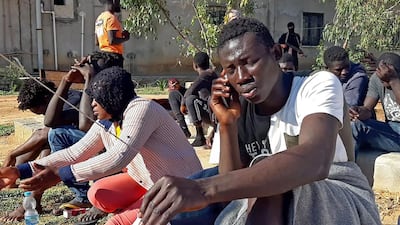Human trafficking groups have turned to illegal organ harvesting to fill a drop in income after a squeeze on smuggling routes, according to a new study.
Dozens of migrants in the insurgency-hit Sahel region of Africa claimed that they had been tricked by brokers into selling their organs after being deceived by promises of new lives in Europe.
Reports have suggested that some of the most vulnerable migrants are paid as little as $1,000 for body parts, most commonly kidneys, which can be sold for a hundred times that amount on the black market.
The centre of the trade is Libya and Algeria, where organs are harvested that have ended up inside patients in countries including Malaysia and Singapore, according to a study by The Global Institute of Transnational Organised Crime.
The findings were based on a survey of nearly 1,700 migrants from 31 different countries who passed through Niger and Mali.
Researchers found that three per cent of those – 50 people – said that they had been trafficked for their organs, while even more had been approached with offers of money for their blood and organs.
The findings come as the gangs, who control the trade in humans, have seen their revenue cut after trafficking corridors were closed off by authorities and are seeking alternative forms of income.
Fewer than 125,000 people were detected by countries arriving in Europe in 2019 compared with more than a million four years earlier at the peak of the refugee crisis sparked by wars in the Middle East and North Africa.
A new anti-smuggling law in Niger has made it more difficult to reach Libya, the gateway to Europe. Migrants who left their homes with meagre resources have been forced into taking drastic measures after running out of money.
The study found that 60 per cent of migrants were trafficked at some point of the route, including many who were detained, kidnapped or forced into slave labour.
"We had instances of migrants being taken to Libya where their organs were harvested and then taken to countries like Malaysia and Singapore," said Arezo Malakooti, author of The Intersection of Irregular Migration and Trafficking in West Africa and The Sahel.
“It’s an emerging form of trafficking and is starting to increase and change because of the search for new income generating streams for traffickers.”
Researchers found cases of Nigerian women being trafficked for sexual exploitation, then later being targeted for their organs.
An estimated 10 per cent of organ transplants around the world are completed using black market organs because of a shortage of legitimately obtained body parts. In 2014, there were an estimated 80,000 kidney transplants worldwide, according to a study in the Lancet medical journal.
Brokers are normally from the victims’ communities and convince them that their body parts are not essential for life, but most victims are duped into signing away their organs – often with false promises of jobs in the country where the recipient lives.
“Through a range of abusive practices throughout the journey, both physical and emotional, the traffickers ensure that the victim is totally dependent and weak enough to be convinced into selling their organs to repay their debt on arrival,” the report said.


